GOLF IN THE KINGDOM COMMENTARY
Tiger Woods limped around Torrey Pines, north of San Diego, to win the United States Golf Championship in a playoff. Woods had a torn ACL and two stress fractures of his tibia. An ACL is like an elastic bandage that hold the knee's lateral support to the leg sockets. In golf, the left knee is the pivot point of the golf swing or turn, where the momentum of the body weight shift is carried through the contact zone.
Woods victory was a Hollywood script in real life. But it also boldly reflected on the state of professional golf. If Tiger could beat the world's best golfers with a busted knee, what does that tell you about the overall condition of the Game? Woods defeated a journeyman pro named Rocco Mediate, who had a hand full of minor tour wins. But all of the world's ranked players came to California to compete for one of the four major championships of the sport. Woods' skills are clearly head and shoulders (and wounded knee) better than the rest of the world. He is the Michael Jordan of his chosen athletic endeavor. And just like during the height of the Jordan dynasty, when he was winning championship after championship, people watched en mass. There is a good segment of the casual fan base which likes to see athletes crush their opponents without mercy. They marveled at the Murderer's Row Yankees, the UCLA basketball dynasty under John Wooden, or the steamrolling Pittsburgh Seta championships in football.
Golf had never been a major spectator sport. Arnold Palmer took the country club elitism and brought it to the middle class in early televised competitions. Palmer was the King, and he had a loyal army of followers. It took a Grand Prince named Jack Nicklaus to dethrone the King to make golf a Sunday afternoon network staple. But it was Tiger that brought the big money sponsorships into the economics of professional golf.
Tiger was a child prodigy. He was groomed before pre-school to become the greatest golfer in the world. Today's parents are attempting to follow in the athletic stage program of their children. Technology advances, especially in spin and distance rates of golf balls, have allowed teenagers to rip the ball 100 yards farther than their fathers, who had hit the ball 50 yards further than their fathers. Many other factors came into play to make golf an accessible sport. The wealth creation of the internet bubble of the 1990s fueled the concept of country club estates throughout America. The boom in real estate was often tied to a designer golf course community, especially in the new era of senior lifestyle subdivisions. Many people put down their tennis rackets of the 1970s and bought golf clubs in the 1990s as a way to stay in step with the current culture.
So the business of golf was good. Major corporate sponsors put up millions of dollars each week in purse money and advertising dollars to lure the best golfers to their tournaments. The prestige of having your CEO present Tiger with a trophy late on a Sunday evening sportscast was priceless public relations. When the economy was rolling along, and public interest was growing, golf was an extremely profitable venture for the professional. You no longer had to win tournaments in order to make big money. Journeymen players who only finished in the occasional top ten could make a million dollars in purse money over a season. Winning purses shot up to more than a million per tournament. Additional endorsements and sponsorship fees allowed the favorite golfers to fly around the country on their own private planes.
But now Woods is lost for the entire golf season. The PGA Tour will be hit the hardest. It had banked its recent success on the Tiger phenomenon. Woods' stature in the worldwide community rose all golfer's economic boats. The loss of Woods as a player comes on the bad trend that the Tour had been losing title sponsors for the past several years. In an economic downturn, most major corporations will cut back on expenses, especially in promotion and advertising. A golf tournament sponsorship is an expensive and time consuming endeavor. The Tour fussed around with this negative revenue trend by trying to artificially create a play-off at the end of the season. Many tour players found the idea misplaced and counter productive. The Tour in its wisdom decided to take away the second oldest tournament on the schedule, the Western Open played in the Chicago area, in order to fashion an end-of-season tournament card. This year the Tour will not even play in the Chicago area, thereby effectively telling the second largest media market that it is not worthy of professional golf even though the Western Open had been one of the most attended tournaments in history. The USGA, which governs the U.S. Open championship, has also scheduled its tournaments with an East coast and West coast bias for the next 8 years. The Midwest is not in their plans. It may be further complicated by the fact that the USGA received higher than normal television ratings on the Torrey Pines event because it found its way into weekend prime time. Prime time portends to higher advertising rates which means more potential revenue.
Just as the professional golf world is at a loss with title sponsors reigning in their commitment to the Game, so are the average golfers. In a tight economy, with food and gasoline prices rising faster than a weekend duffer's handicap, a round of golf because a luxury item. A typical round will cost between $35-$200 a round. For many golfers, it averages about $1 per golf club swing, excluding the cost of adult beverages and/or cigars. It comes down to micro personal economics: two tanks of gasoline or one afternoon of a nice walk in the park ruined? In an era of belt tightening, the perceived luxury items are the first items to be sacrificed in the name of fiscal responsibility.
In the end, a long Woods recovery and a long mild recession, will drive down the purses to the professional golfers, and cause the public and semi-public golf courses to lower their prices in order to recapture their players. A golf course has a finite number of foursomes each day. For every open slot, that revenue can not be made up in greens fees. The balance is like a golfer's risk-reward strategy: do I play it safe or try to hit the perfect shot? The PGA Tour is now going to have to scramble to preserve its revenue and status in the sporting landscape because it had played it safe and rode the coat-tails of Tiger Woods for a decade. Golf in America will be altered by the mere fact that one player had an unfortunate knee injury.

MOVE * E WE KID BECAUSE WE CARE bySki
This story begins many many months ago. Rocky, our Tech Guru, toiled away teaching technology to a dwindling number of eager students over the years. He used his Internet skills and boldness to integrate himself in various on-line communities to expand his social life. In various long distance, chat room, telephone marathons, he found himself in a digital relationship. He took the relationship to the serious stage and now is happy to have a nice girlfriend. In Florida. He resides in Montana.
There is much juggling in any relationship. A long distance relationship has more objects to juggle. The biggest one is distance. But that has now changed; he has decided to move to Florida.
This spring he went to Florida to check employment and housing situations. According to the Miami Herald classifieds, the only jobs are nurses, bed techs and unpaid extras in the film industry. Florida was in the middle of the construction-housing bubble. When it burst last year, it imploded. The rollercoaster of the construction boom increased the service sector supporting it; whether it was financial, legal, accounting, government permitting, infrastructure consulting to technology support. There was a huge influx of workers from other states to catch the employment demand in Florida. But when the down turn hit, it took more than 40 percent of that active economic synergy. Now, no longer do just retirees go down to Florida to die, careers also do.
So this spring, Rocky goes down to Florida to check out employment prospects and housing. He finds that there are reams of short sales, where desperate sellers are so screwed that the fair market value of their house is substantially less than what they owe on it. Foreclosures and bank repossessions are also common. There are plenty of empty residences lining the coastal towns. His 16 day trip to investigate turned into a six week extended stay. He plans to move to Florida in late July, and traveling through Illinois in a U-Haul to catch up at a college reunion in suburban Chicago.
Now Rocky would readily admit that he would have a large tattoo entitled Procrastinator on his arm if he ever decided to get around to it. And being away from the homestead for an extended period of time would leave a massive amount of domestic engineering to take care before packing a rental truck for the long and gasoline card squeezing trip cross-country.
Well, Rocky booked his travel plans through the Internet like the frequent flyer that he has become. He flies out of Florida to a connection flight through Atlanta, then onto Billings for the final journey across Montana to Bozeman. On the night I figured he would have arrived home, I get a cryptic message about how the entire American airline system is broken and that only idiots work at the Delta counter. Apparently, a small rain delay in Florida caused him to miss his connecting flight in Atlanta. Instead of a later flight that afternoon, the busiest airport in America had none. So Rocky was forced to stay overnight in the Peach state. He was not in a peachy-keen mood. He was in a sourmash mood by being two days and several dollars short on his return trip.
I could just imagine his return home to open his refrigerator to a napalm welcome:
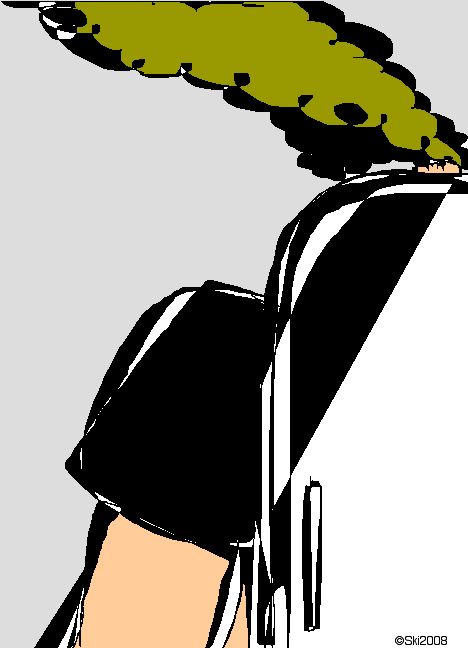
He went radio silent on us for a little while. He has a Twitter account where he snaps off quips now. I now call him Conway Twitter, because his email replies are far and few between. He actually rails against the messages that I have recently sent him: I copy his twitter comments, paste them into an email, and send it to him with my smart ass remarks. I think he thinks that is a waste of a highly dynamic information technology.
It was several days before he contacted me by email. He claimed that the whole snafu airline trip had exhausted him to no end. I thought, right:

But his self imposed deadline was less than a month away. He had to focus on the multi-tasks at hand. Moving is a universal experience; everyone has done it at least once in the past decade. But when you are moving out of town, the issues of banking, future status of your old house, storage or garage sale of your stuff, packing, renting a truck, planning a long distance trip, finances . . . there are a ton of details. And most of those tasks are the physical variety; you can't pull down a computer menu and click Magic Move.
It was probably my cynical nature, my satirical state of mind and past experience of helping him move from Wyoming to Montana a long time ago, that I had to keep a flame under him. So I emailed him this cartoon:
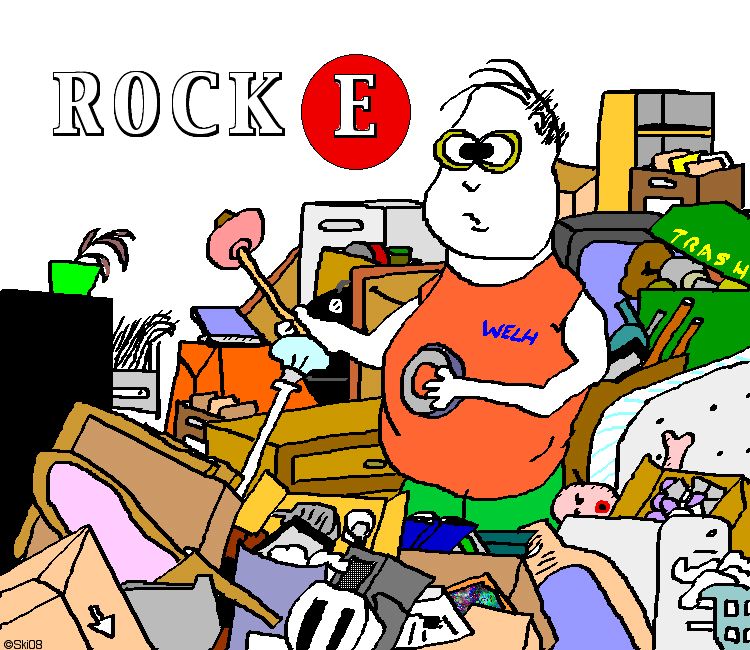
The Disney-Pixar movie is about a lone robot left on Earth to clean up the entire planet which the last humans left as a worldwide junkyard-garbage heap. Here, one man against his own stuff. I received no response from him. No bother.
About a week passed when Rocky again inferred by the Internet that he had become slightly sidetracked in his planning of his big move. So much so, that he was sowing the seeds of doubt whether he would be doing the Big Move in July. So not skipping a beat, I fired off this next cartoon to him:
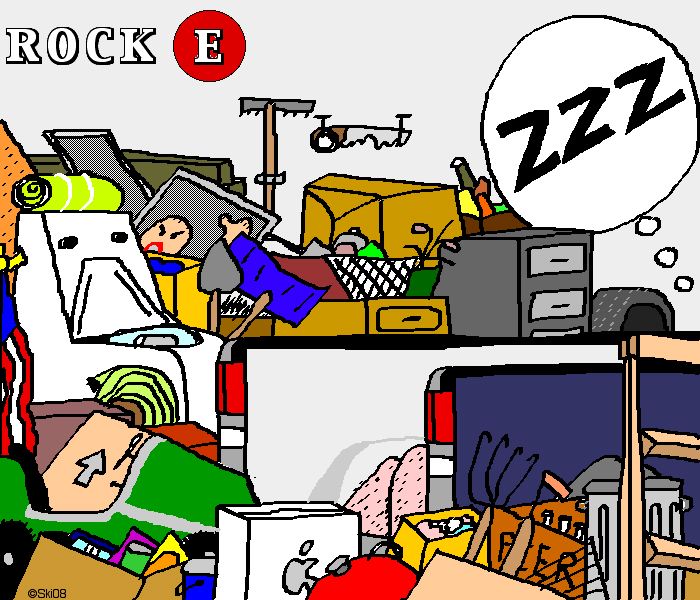
Maybe this would get the message across more clearly. We have moved from home office to the garage, where more than one man has be lulled into the dreams of accomplishment in the friendly confines of this testosterone play space. Maybe this was literally hitting too close to home, because, again, there was no direct response.
A few more days pass until another Conway Twitter message. Something about going to the back country to celebrate the Second Amendment. That's what pioneer stock natives do in Montana. Revel in their constitutional rights, including shredding targets with high caliber rounds. Now, I have actually prattled in this fine ritual. But I feared that this side trips would be putting Rocky way behind his original moving schedule. I could not figure out where he could have bottlenecked himself. But to move from the small flame under him to flame thrower mode, I sent out this email attachment:
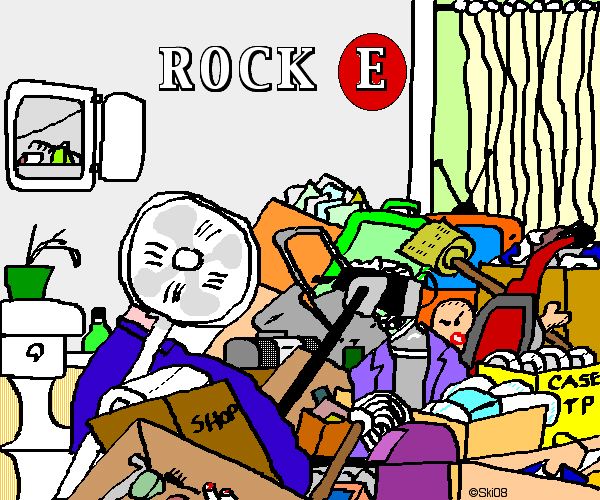
Certainly, this should have drawn a reaction or at least a bodily threat. But alas, not a peep. I suspect that he must be deleting all email attachments under some spam software filter. But I know his email account is still functioning, because he did chirp on one upcoming family IT house call of mine. With about three short weeks to go before he is supposed to leave Bozeman in the packed U-Haul, there has yet to be a significant progress report. I suspect a harassing and desperate late night phone call at some point after the Fourth of July, but my schedule is so tight I have no free time to bail out a buddy . . . even from jail. Or self-imposed exile. Or a corrupted Excel file. Or a corroded file cabinet. Or an unboxed kitchen cabinet.
So I really expect if Rocky has a living room web camera, or an iChat feed, that this is what I would be looking at now:
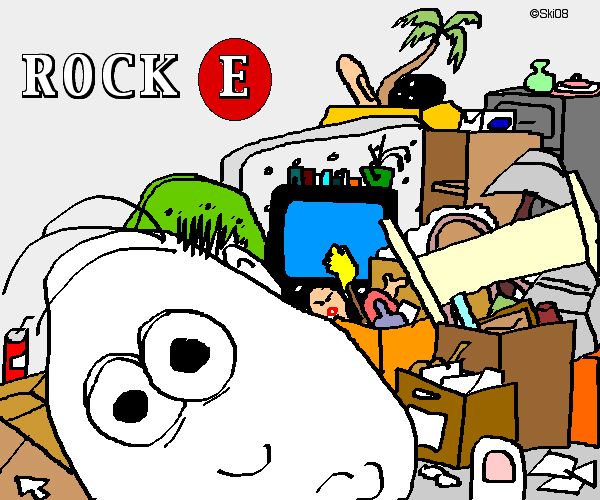
This is a very long explanation to get to a legitimate piece of commentary. When one moves along in Life, there is a growing expanse of stuff that we collect. In the digital age, our hard drives are magnetic attics that are filled to brim with stuff we save just because we can save it with one simple mouse click.
There is an old saying in the real estate business, that no matter what size of dwelling a person has, he or she will quickly fill it to the brim. It is part and parcel of our consumer society. Even when people attempt to downsize, their material goods are often put into monthly storage rather than the land fill. As a general rule, we are a pack rat society. And those deep habits have been transported over into our digital lives.
Forty megabyte, steel plated, heavy weight hard drives used to be the gold standard in early personal computing. Now, such relics are dust collecting shelf paper weights or bass fishing boat anchors. Storage devices are in the gigabytes now. And with every new purchase of a computer or ancillary drive, people do the natural thing: they copy over their old files into their new drives. The accumulation of their old files, whether accessed or read in years, is continued on from computing generation to generation, building up an ever increasing amount of digital land fill. It has to be a rooted fear that sometime in the future, we will need to see that old ten year old receipt. Back up your data. Make copies of your data. Secure your data. It is the rare occurrence that you are taught to purge your data.
So when a person is moving across the country, his digital possessions and information must travel with him. What to pack and what to store? That is the question. Even one's electronic banking network could get bogged down by the simple new forwarding address by financial privacy rules, bureaucratic red tape, the cross check against identity theft and credit information consumer relations outsourcing to unqualified clerks. Every person has a detailed retail and financial history database in their wallets. But one simple anomaly like a change in address in the credit processing can cause a person severe bureaucratic pain. Planning and execution is the most prudent course to avoid moving nightmares, including in one's digital life.
iToon
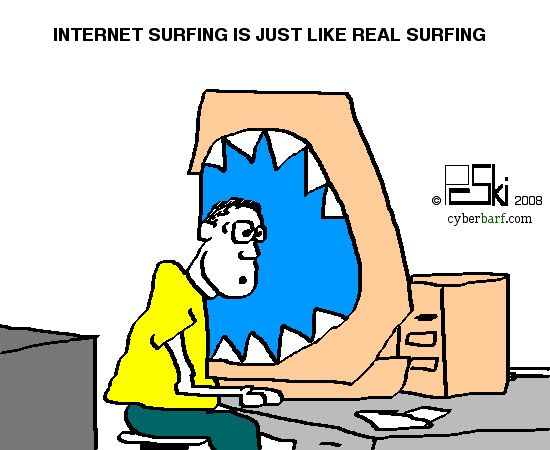
REAL NEWS KOMIX
 |
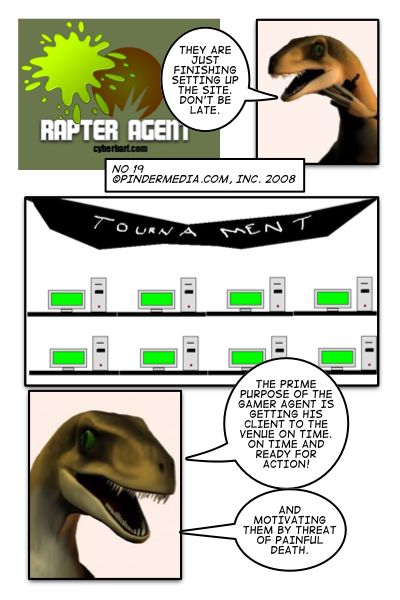 |
iToon

THE WHETHER REPORT STATUS
Question: Whether opinion writers are correct in their thesis that the Internet is contributing to the Dumbing Down of America?
* Educated Guess
* Possible
* Probable
* Doubtful
* Vapor Dream
Question: Whether wikipedia will be taken over by public relations firms whose mission will be to edit out unflattering facts of their clients?
* Educated Guess
* Possible
* Probable
* Doubtful
* Vapor Dream
Question: Whether Bill Gates' retirement will adversely impact Microsoft?
* Educated Guess
* Possible
* Probable
* Doubtful
* Vapor Dream




